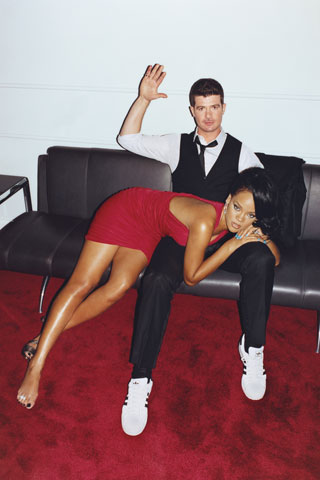By: Victoria Barker

By now most people have seen the infamous performance of Miley Cyrus, 20, at the 2013 Video Music Awards last month. Scantily clad, she gyrated on artist Robin Thicke, 36, as they performed We Can’t Stop and Blurred Lines in front of thousands of fans. Since the video has gone viral, Miley has been the topic of much conversation and publically embarrassed as people have condemned her evolution from a Disney Channel star and a role model for young girls to a sex icon following in the footsteps of Britney Spears and Madonna, both of whom have previously raised eyebrows and garnered criticism for their infamous VMA performances. Miley sees nothing wrong with her performance. She argues in an August 28th interview with MTV that she and Thicke were just “making history” and “Madonna’s done it. Britney’s done it. Every VMA performance, that’s what you’re looking for; you’re wanting to make history.” But is this the history that we are really willing to accept?
Cyrus’ performance is not one that most people affirm, but the public outcry to her spectacle is one that is even more demoralizing than her fashion choice and dance moves. While we have focused on the racy 20-year-old, not much regard has been given for the 36- year-old who danced behind her. People have responded with intense criticism towards the former teen-sensation, likening her to an impending “train-wreck” that Britney Spears and Lindsay Lohan once characterized, without condemning the womanizing and degrading behavior of her married co-star. Thicke, who is most famous for his recent sensation, Blurred Lines, with artist T.I., made headlines for his controversial music video this past summer. Thicke responded to the criticism in a GQ interview, “we tried to do everything that was taboo. Bestiality, drug injections, and everything that is completely derogatory towards women. Because all three of us are happily married with children, we were like, ‘We’re the perfect guys to make fun of this.’”

But is any man really the “perfect [one]” to degrade women? While Miley Cyrus’ outfit and performance can hardly be viewed as respectful towards herself or other women, perhaps we should hold Thicke more accountable for his actions, which were clearly not funny or the least bit freeing towards women. It cannot solely be violence towards women that generates contempt for male celebrities’ actions. Take for example, Chris Brown and Rihanna: the pictures that surfaced in 2009 of Rihanna’s battered face at his hands nearly ruined Brown’s career. However, photos from a 2007 GQ photo shoot showing Rihanna lying submissively on Robin Thicke while his hand is raised as though about to hit her did not produce any public criticism. It appears as though it is okay for a man to act as though he will hit a woman, as long as he does not actually hit her. We cannot wait until after the act of violence to condemn actions that continually lower women to the status of domestic and farm animals, such as that in Thicke’s music video, and elevate men to places of power over women. Doing so allows them to disregard women’s signs to stop while glamorizing rape and other forms of violence through catchy music videos and photo shoots. The hard and fast line cannot be that of violence, but rather one that is now considered the blurred line of objectification and degradation.
While Thicke may continue to garner attention for his Number 1 spot on The Billboards chart with his single Blurred Lines, perhaps its time that we respond to his belief of, “what a pleasure it is to degrade a woman.” If this mindset continues to take hold and be glamorized by men, the status of women and girls will continue to descend in a country that once took pride in respecting women and allowing them opportunities to succeed. The women’s rights movements of the late nineteenth and early twentieth centuries have been disregarded, as gender norms continue to become more polarized by celebrities, such as Thicke. Using their celebrity status and influence in pop culture, these men elevate all men into positions of power over women while women are lowered in status to that of animals.
There needs to be a stricter moral outcry by men and women alike when men are applauded for parading around naked women and singing lines such as, “I know you want it” and ignoring their pleas to “stop.” This scene from Thicke’s video makes rape appear trivialized. In doing so our advancements in the rights of women and the freedom and security that they have fought for becomes insignificant. A decline is inevitable as we revert towards gender inequalities that could transcend more than just social norms when we start to embody the same attitudes towards our women—criticizing and publically humiliating them for their promiscuous actions without regard for the men that are taking advantage of them. With this attitude towards Cyrus’ distasteful performance our behavior seems to parallel that of other male-dominated countries that we have formerly condemned for their gender inequalities. Take, for example, Russia, where domestic violence towards women remains legal, and Saudi Arabia where women are still not permitted to drive.
Situations such as this social phenomenon only echo the need for women’s resource centers on college campuses. UGA student Uzma Chowdury advocated for just that in her recent article on “Women, Rape, and UGA”. Before women are blamed for their clothing choices, maybe it is time that men are held accountable for what Thicke describes as a “pleasure” — degrading women.
